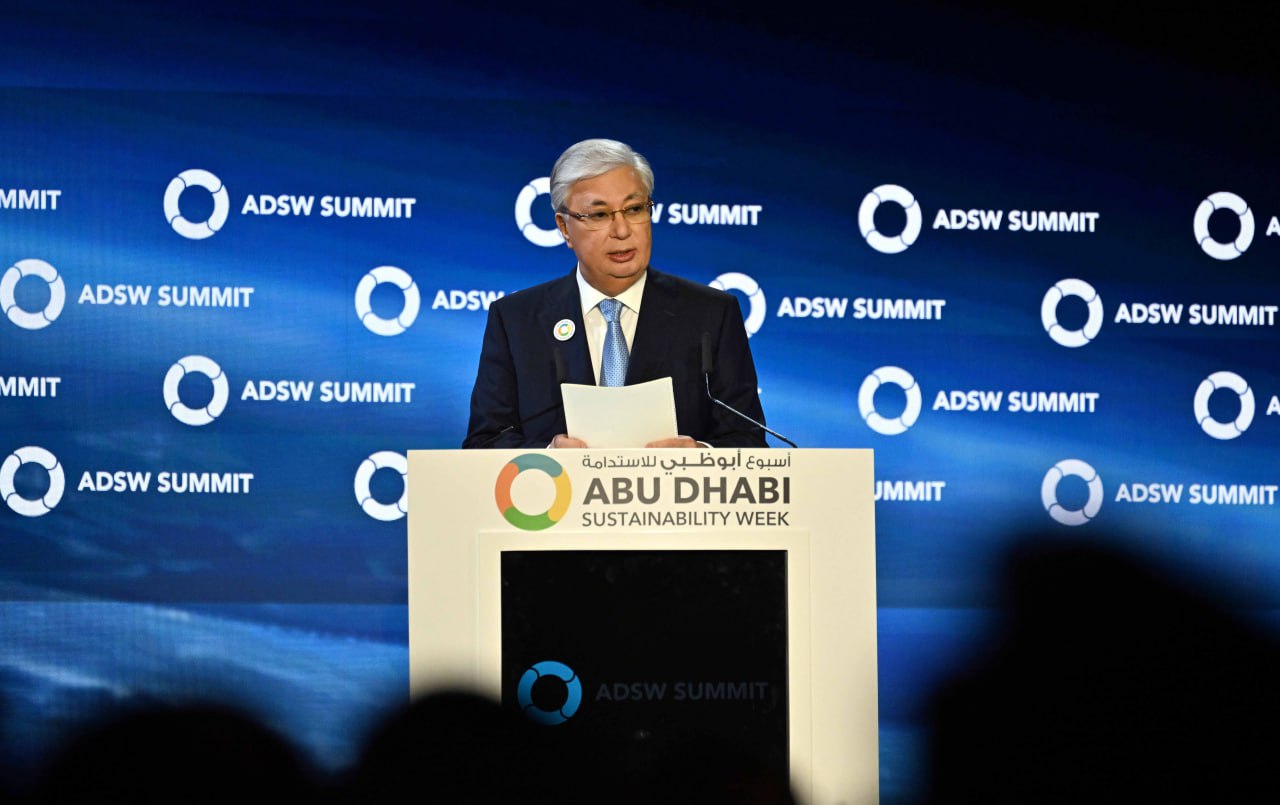ASTANA – Kazakh President Kassym-Jomart Tokayev highlighted the pressing realities of global climate change, desertification, extreme weather events, biodiversity loss, water scarcity, and food insecurity in his address, named Toward a New Development Paradigm: Resilience, Growth and Sustainability, at the Abu Dhabi Sustainability Week (ADSW) Summit on Jan. 14.

President Tokayev Focuses on New Development Paradigm at Abu Dhabi Sustainability Week Summit. Photo credit: Akorda
These challenges are further exacerbated by rising geopolitical tensions and disrupted supply chains, creating a pessimistic macroeconomic outlook. The World Bank’s forecast for the next five years anticipates the weakest global economic growth in three decades. In this context, Kazakhstan plans to focus on digitalization and artificial intelligence (AI), big infrastructure projects, and nuclear energy.
According to the President, globally, energy systems account for 75% of greenhouse gas emissions and 10% of biodiversity loss, making it imperative for international partners, including major energy companies such as Masdar, Total, and Eni, to invest in green energy projects. The abovementioned firms pledged 43 gigawatts of green energy projects in Kazakhstan.
Tokayev spoke about the construction of the country’s first nuclear power plant, following a nationwide referendum, which marked a significant step toward national sustainable energy development.
“Kazakhstan also seeks to secure a diversified supply of critical raw materials for world markets. These materials are indispensable to achieving the world’s net zero targets,” he stressed.
Transport infrastructure
As a leading transit hub in Eurasia, Kazakhstan sees transit and transport as essential prerequisites for sustainable development, thus investing heavily in transportation infrastructure. To further enhance connectivity, the country is committed to developing the Trans-Caspian International Transport Route and the North-South Transport Corridor, while also playing a pivotal role in the Belt and Road Initiative.
Central Asia’s increasing vulnerability to global warming, with regional temperatures rising faster than the global average, poses threats to ecosystems, livelihoods, and food security. The President underscored the urgent need for climate adaptation strategies, including early warning systems, improved water and land management, the modernization of irrigation systems, the establishment of effective water management agreements, as well as utilizing AI, satellite monitoring, and other digital tools.
Food security
Food insecurity also demands urgent attention, with Kazakhstan playing a significant role as an exporter of wheat and flour. Tokayev reiterated the country’s commitment to advancing sustainable agricultural practices and technologies to ensure a stable global food supply.
To confront these challenges, the President stressed the need for a new development paradigm rooted in resilience, equity, and sustainability. He outlined a holistic framework built on three critical pillars: green financing, which “must increase dramatically,” enhanced international cooperation on technology transfer, technical support, and scientific research, and a synergistic relationship between climate priorities, economic development, and AI. By 2030, it is expected to contribute over 16% of global GDP.
“This underscores the importance of a flexible and tailored approach to support the different sustainability goals of nations. The challenges we face are immense, but so are the opportunities. Now more than ever, we must unite and cooperate practically, effectively, and with impact,” Tokayev concluded.
